What to do in Julian, the SoCal town that’s exploding with fall magic
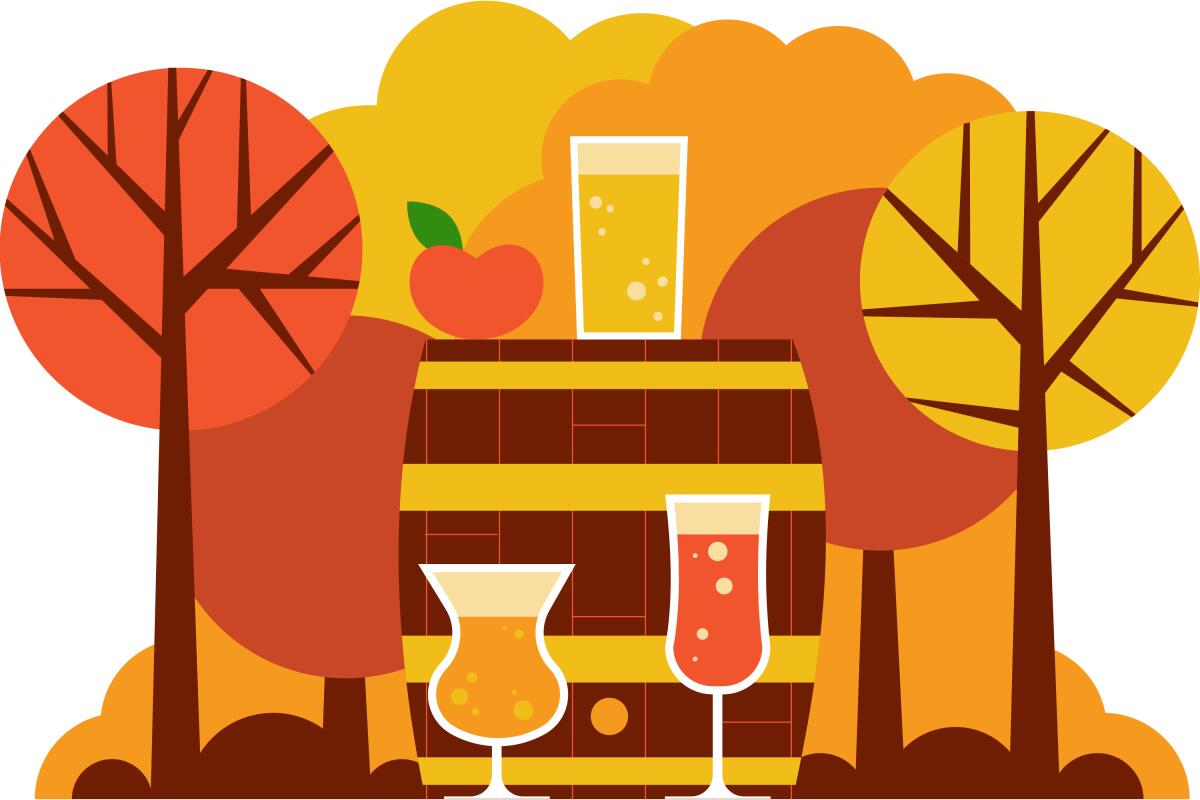
By Rachel Schnalzer
Good morning, fellow Escapists. Last week, we tried to forget about the heat, threw on our metaphorical jean jackets and went apple picking. Now, we’re heading to Julian, a San Diego County town that many consider the Stars Hollow-esque capital of autumn in Southern California.
I spoke with three cider aficionados from Julian, who know the ins and outs of growing, pressing and fermenting local apples. They shared their cider tasting tips, advice for spending the perfect fall day in Julian and what they believe makes the small community so irresistible to travelers coming from San Diego, L.A. and beyond.
Get inspired to get away.
Explore California, the West and beyond with the weekly Escapes newsletter.
You may occasionally receive promotional content from the Los Angeles Times.
First, tell me about your cidery
Pauline Storum, co-owner of Storum Ranch: “We have about 2,500 apple trees, in 60 different varieties, grown onsite. We pick the apples, press them and let them ferment — and we don’t add any sugars or other additives to our ciders. They’re made in a very traditional fermented-to-dry-style so that the apples can really shine through.
“What I love about the ciders that we make is that you know there’s no heavy sweetness. You don’t feel really bogged down like you can after you have some other beverages. You just feel good.”
Brian Mayer, marketing/sales director at Julian Hard Cider: “We use fresh-pressed apples that are juiced and fermented. Then, we take the cider base and use other fruits to flavor the ciders. We developed a reputation for doing flavored ciders that could appeal to more than just one category. Currently in our tasting room we have 12 ciders on tap, so we have a lot to offer.”
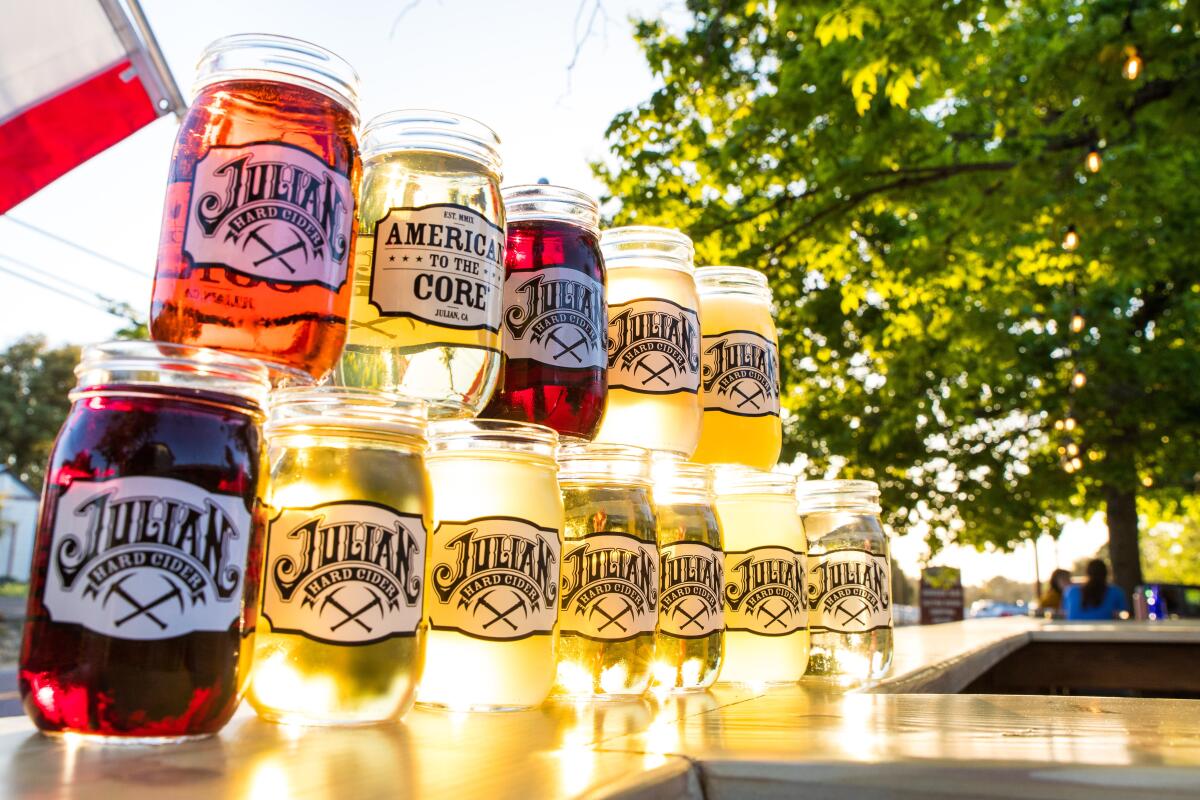
David Young, co-owner at Calico Cidery: “My family had been going to Calico Ranch since I was a kid, and when it went up for sale in the 1980s, we decided to purchase it because we loved it so much and wanted to see it keep on going. It inspired me to study pomology and viticulture in college, and I went on to work in the wine industry for 20 years.
“About eight years back, we decided to take Calico fully organic, and my sister and I moved back down to Julian and started doing hard cider. From there, it’s gone really well. Having the cider really sustains the orchard and makes it economically viable enough to survive into the future.
“We remain a small cidery and offer four ciders on tap. We provide an outdoor picnic space where people can see and appreciate the trees — rarely do you get the opportunity to hang out in an organic apple orchard.”
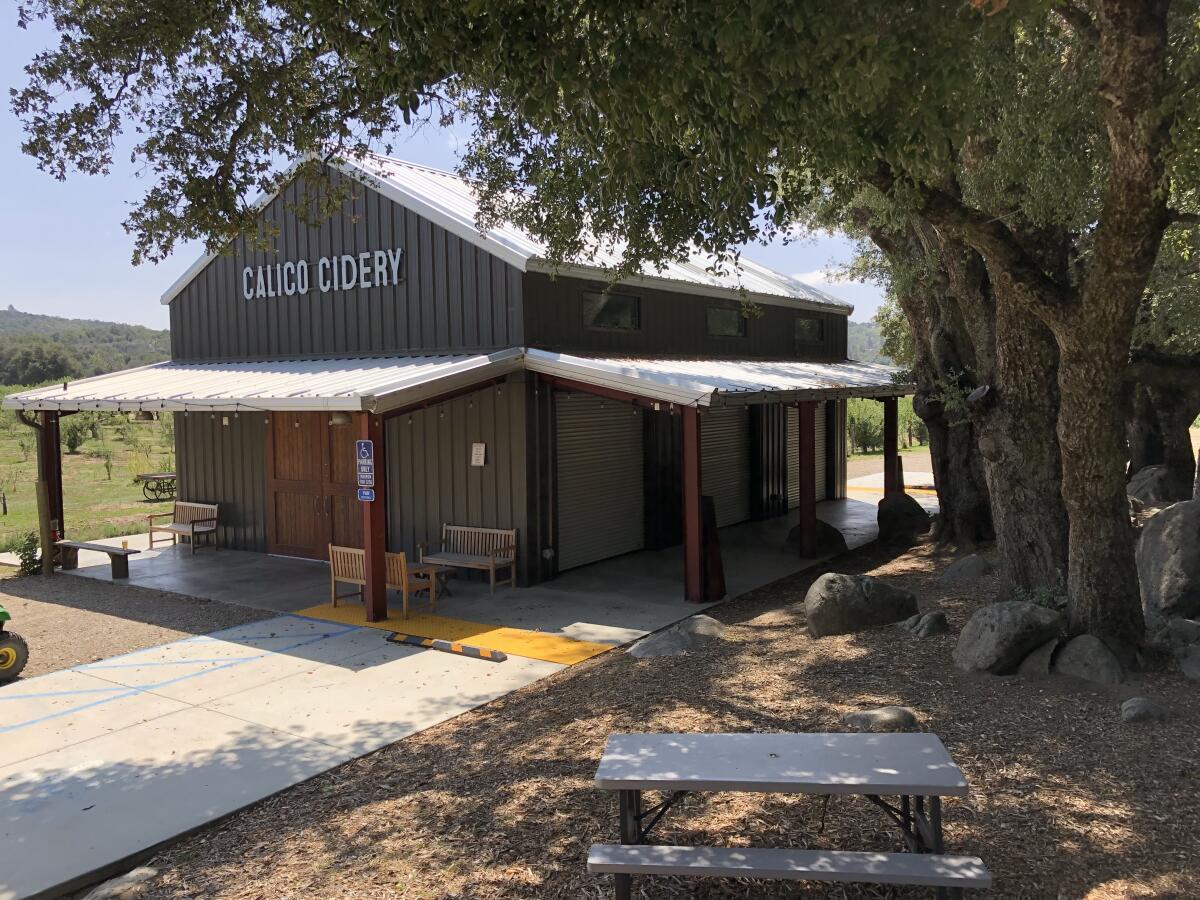
What’s your favorite cider that you currently offer?
Pauline Storum, Storum Ranch: “I’m really torn between the Kingston Black and our Newtown Pippin blend. The Kingston Black is a very traditional English apple. It’s pretty finicky but it produces amazing juice and cider. It’s just crisp and light, and it’s just a great refreshing cider to drink.
“The other one is our Newtown Pippin blend, which is a blend of 60% Newtown Pippin, 25% Golden Delicious for a little bit of sweetness and 15% Black Twig, which adds a little more complexity and tannin.”
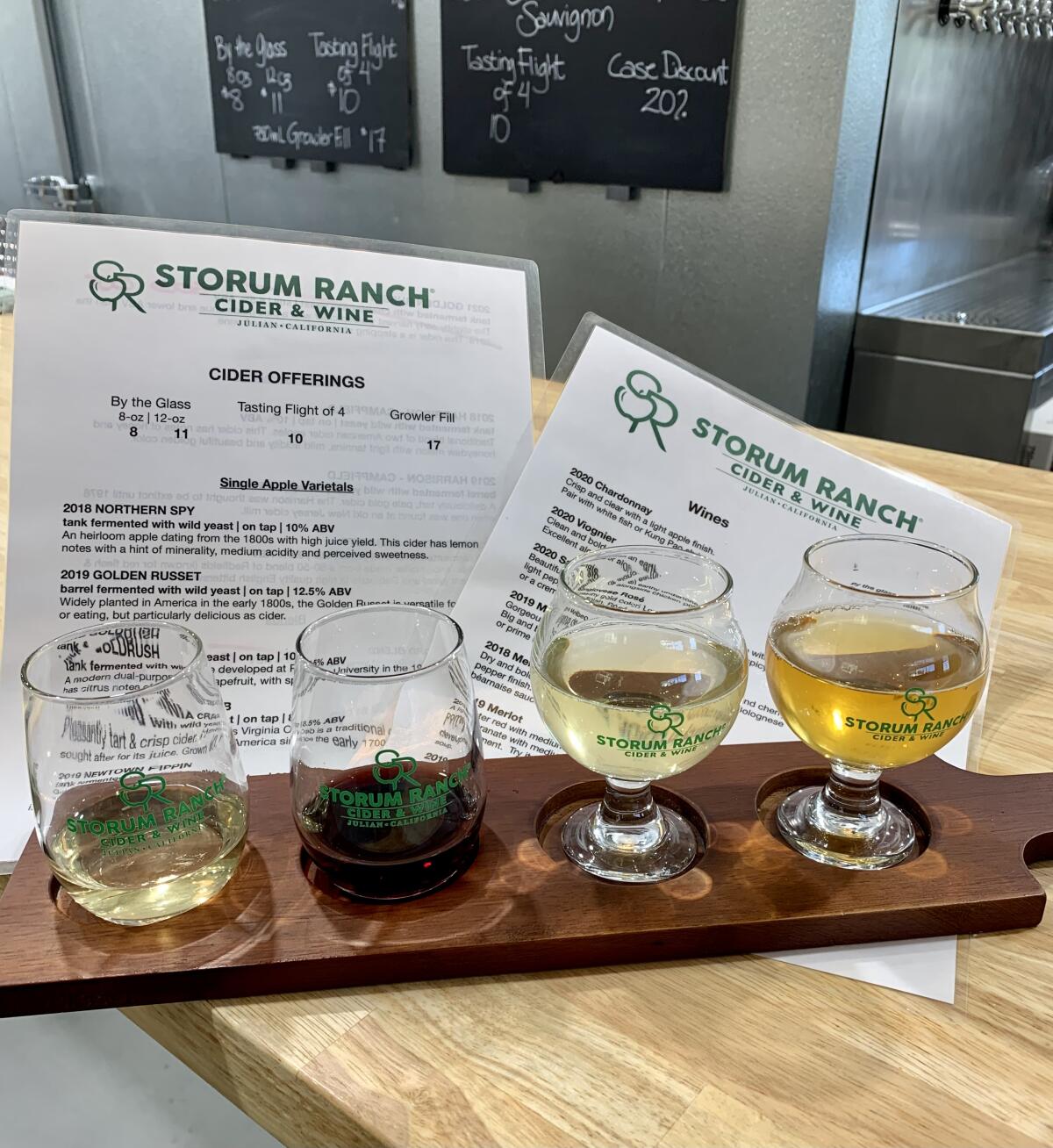
David Young, Calico Cidery: “Right now it’s a pear-based cider, made from our pear trees that were planted back in the 1920s. Because there isn’t much of it, it goes fast.”
Brian Mayer, Julian Hard Cider: “The strawberry rhubarb is really good — it’s only available in Julian. We use our tasting room as kind of an incubator to see what people respond to before we make it commercially available throughout Southern California.”
Do you have a tip for cider tasting?
Brian Mayer, Julian Hard Cider: “Ordering a taster flight is a great way to go — you don’t want to be over-consuming, and a taster flight lets you sample a wide variety of different ciders without drinking glass after glass.
“And if you’d like to take some home, we offer growlers. Pick one up on your way out of town and avoid leaving it unattended in the car, because it could go bad.”
Pauline Storum, Storum Ranch: “For folks who are not familiar with cider, just come with an open mind. Ciders that are fermented to dry are not especially sweet, and if you’re expecting your cider to be like a spiked Martinelli’s sparkling apple juice, our cider is not that. But if you really want to try traditional cider, and really be able to experience the difference between apple varieties, we are your jam.”
Enjoying this newsletter? Consider subscribing to the Los Angeles Times
Your support helps us deliver the news that matters most. Become a subscriber.
Let’s talk about Julian itself. What would be your perfect fall day in town?
Pauline Storum, Storum Ranch: “I would drive up to Julian and stop at the California Mountain Bakery on Highway 78, get one of their breakfast sandwiches and try to resist the temptation of the sticky buns and all of the fresh scones that they make.
“Then, there are a couple of good hikes — there’s the Santa Ysabel East Preserve, where you can have a nice walk, or you can hike up Volcan Mountain if you’re looking for a little more exertion. At the top, you can look down and actually see our ranch. Then, stop into Storum Ranch, get a glass of cider and enjoy it out on the deck.”
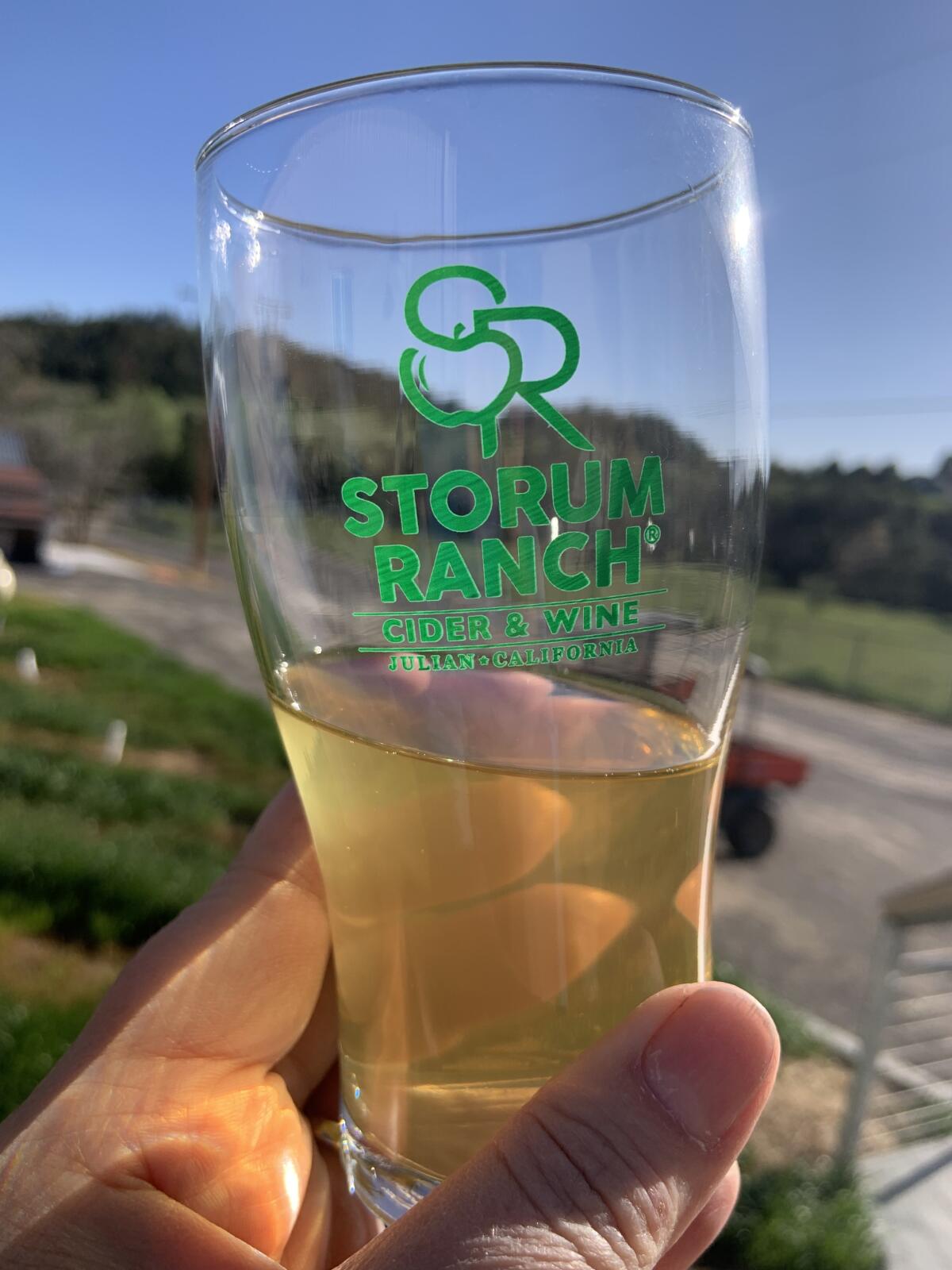
David Young, Calico Cidery: “I could definitely spend a Saturday hiking, cider tasting and eating apple pies. I would probably do a hike in the Santa Ysabel County Preserves and then go to lunch at Quecho and then pick up cider and a pie on my way home — though I think my kids would want me to go to Fort Cross.”
Brian Mayer, Julian Hard Cider: “Start your day off early with a hike. Volcan Mountain is one of my favorites — it’s about a 2½-hour hike. At the top you can see all throughout Julian and the surrounding areas and down to San Diego on a clear day. I also like the Three Sisters trail. Once you get back to town, hit up some of the small local stores. There’s lots of different crafts and art that is only available in Julian. From there, grab lunch and shoot on over to our tasting room.
“Our tasting room is in Julian Station, an old apple packing facility from the 1940s, a bit outside downtown Julian. There’s plenty of parking and, on the weekends, there’s live music.
“If you can, stay the night in one of the multiple vacation rentals in town, because there’s so much to do in Julian.”
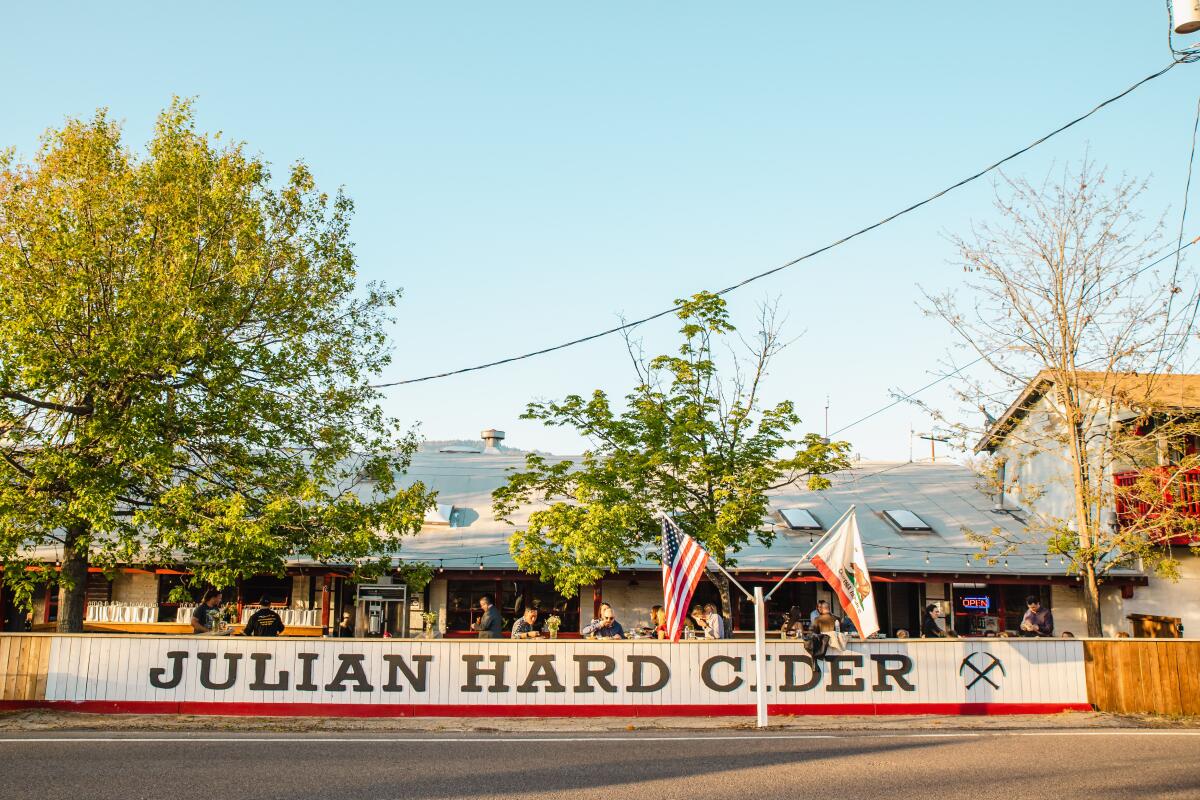
What makes Julian special?
Pauline Storum, Storum Ranch: “The community that lives here. It’s a nice small-town vibe, and you really get to know your neighbors. I think people really enjoy escaping the hustle and bustle of Los Angeles, Orange County, San Diego, to the quiet and stillness of Julian. There’s open skies, you can hear the birds, and it has just a wonderful peacefulness.”
David Young: Calico Cidery: “Julian is one of the few places in Southern California where apples can grow, because of our high elevation. Just an hour away from San Diego, it’s remote but accessible — you can do it on a whim on a Saturday. When you visit Julian, you can feel the change in the air. You get that kind of sweet pine tree scent.”
Brian Mayer, Julian Hard Cider: “Up here in Julian, you have the four seasons — maybe not as pronounced as the East Coast — but we have some snow in the winter, the fall leaves changing color, the crisp cool. In the spring, we have the super bloom toward the desert and rain.
“There are lots of small businesses and hardly any big-box stores or huge supermarkets; everything is smaller-scale. Coming up here from Los Angeles, Orange County and San Diego is kind of like a step back in time.”
What do you wish tourists knew about Julian?
Pauline Storum, Storum Ranch: “To access Julian, you’re on mountain highways. If there are cars behind you, use the pullouts to let the faster cars pass. Everyone will get there. There’s no need for road rage.
“The other thing to know is most businesses close early. If you’re expecting a late night, Julian is not the place for it.”
Brian Mayer, Julian Hard Cider: “Julian is an international dark sky community, a great place for seeing the stars at night.
“Also, it’s important to pay attention and slow down while driving. There are a lot of places where people cross the roads and accidents happen. Lastly, if you come up to Julian for a picnic, make sure to pack your garbage out.”
David Young, Calico Cidery: “Take time to learn about Julian’s Black history. [Editor’s note: Young recommends reading this Smithsonian article.]
“Also, it’s fun to visit Julian in the fall, but spring is actually my favorite time of year. We get some nice flowers, and it’s an easy stop if you’re going to the desert. It’s cool to go to the beach, to the mountains and to the desert all in the matter of an hour and a half.”
What’s the best place to eat before or after cider tasting?
David Young, Calico Cidery: “We’re big fans of Quecho and the Julian Beer Company — their barbecue is absolutely amazing. Fat Anthony’s Italian Deli is a little bit under the radar. It’s a great local spot.”
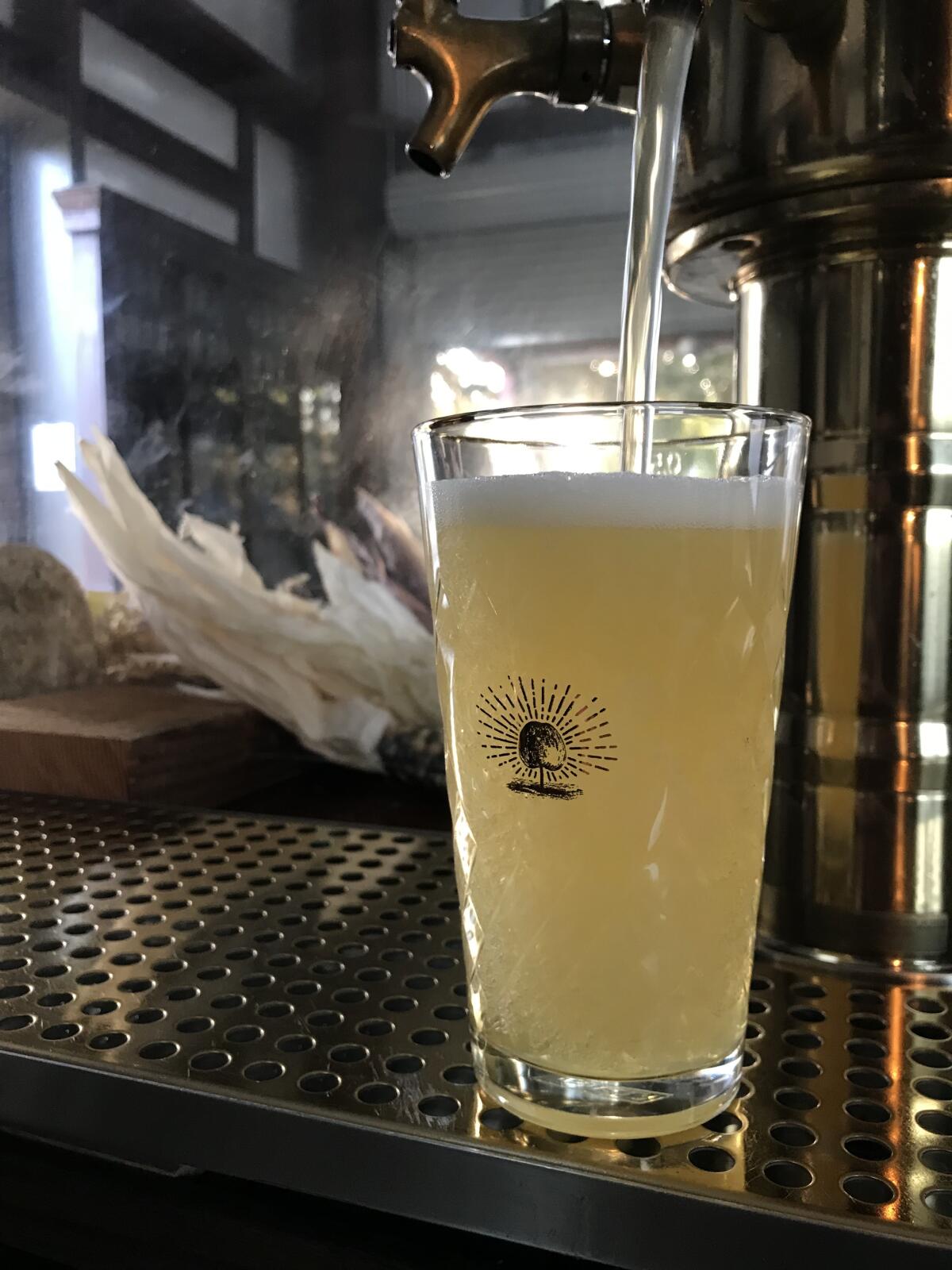
Brian Mayer, Julian Hard Cider: “Our pineapple lime cider goes great with Mexican food at Quecho in downtown Julian; our Cherry Bomb or Black and Blue goes great with barbecue, which you can find at Julian Beer Company, or with burgers at Jeremy’s on the Hill; and our Harvest Apple goes great with pizza, which you can get at Heroes Wood-Fired Pizza or Romano’s.
“The pies in downtown Julian are great. If you want to wait in line to get a pie, then definitely do so — but there’s another location of Mom’s Pie House just five minutes outside of town in Wynola that has parking and sometimes there’s only a few people in line.”
What’s the best place in town to snap a photo?
Pauline Storum, Storum Ranch: “I like the quiet out in the wilderness. Anything up near Volcan Mountain is my favorite.”
David Young, Calico Cidery: “I love the view from Inaja Memorial Park — it overlooks the whole valley of Santa Ysabel.”
Brian Mayer, Julian Hard Cider: “The corner of downtown Main Street, the four corners, that’s pretty much the snapshot of Julian.”
Sign up for The Wild
We’ll help you find the best places to hike, bike and run, as well as the perfect silent spots for meditation and yoga.
You may occasionally receive promotional content from the Los Angeles Times.




